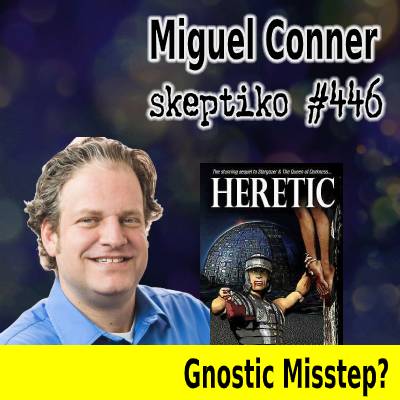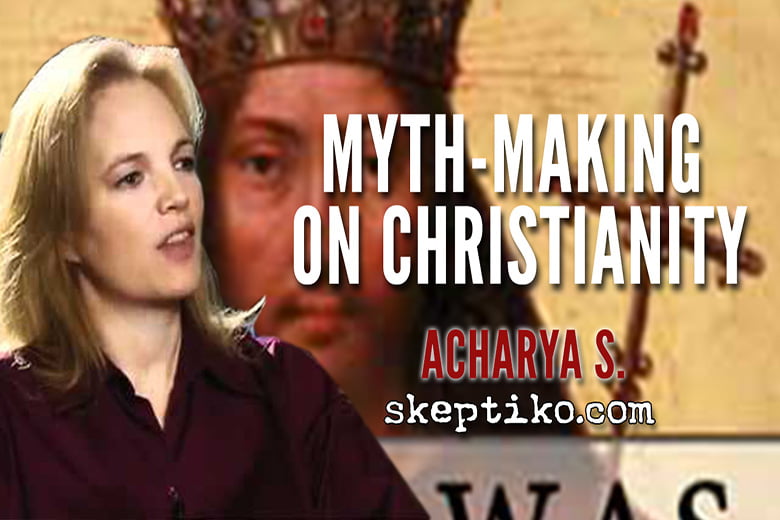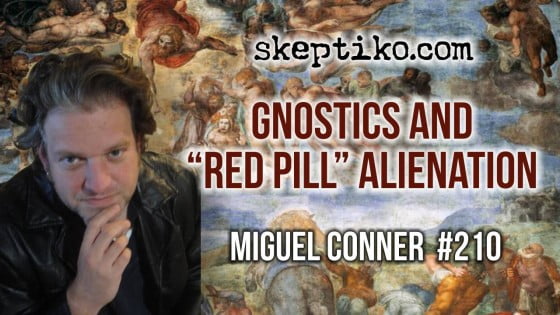Dr. Elaine Pagels is a religious scholar, but that didn't prepare her for personal grief. Click here for the Elaine Pagels' website...
Tag: gnosticism
Miguel Conner, Gnosticism and the Evil Question |446|
Miguel Conner explains how Gnosticism tackles the evil question. photo by: Skeptiko Welcome to Skeptiko where we explore...
Miguel Conner on why Gnosticism more relevant than ever |338|
For 10 years Miguel Conner has been a leading voice for Gnosticism, so why the sudden interest in his ideas? photo by: Skeptiko Alex Tsakiris:...
Why are so many movies going Gnostic? |315|
Miguel Conner explains why movies like Snowpiercer and The Lego Movie rely on Gnostic themes. photo by: Bong Joon Ho Today we welcome Miguel...
226. Acharya S. Examines the Effects of Myth-Making on Christianity
Click here for YouTube version Click here for forum discussion Click here to post comments on AlexTsakiris.com Interview with religion and mythology scholar Acharya S. (D.M. Murdock) examines the effects of early Christianity on other religions of the time. Join Skeptiko host Alex Tsakiris for an interview with Acharya S. author of, Who Was Jesus? Fingerprints of The Christ. During the interview Acharya talks about the religion and myths: Alex Tsakiris: One of the things that your work is really important in doing, and it’s something we didn’t talk enough about, is that it’s a really thorough analysis of the power and practices of cultish behavior, of power formation, and power manipulation. I think unless we really come to grips with this we can’t separate out what happened to these religions. On one hand we have these traditions and these myths and those that made the myths, and on the other hand we have the same characters that we see on the landscape today that say, “Hey, wait a minute. Maybe I can make a buck off of this. Maybe I can control things. Maybe I can make my group superior and win out over the other groups. And maybe I can use these myths to do it.” Unless we thoroughly understand that stuff, and at the same time appreciate the possibility that there is some genuine non-biological-robot, spiritual experiences that may be happening; until all that’s on the table, we can’t really get our arms around it. Acharya Sanning: What I’m just doing is writing a factual recitation of what has happened in these places. It’s very empowering to know this stuff. Also, when we were talking in the beginning about being in the middle between extremists on either side, this mythicism position that I am discussing which looks at supernatural beings in antiquity as mythical figures, not real people who landed on planet Earth and did a bunch of magic tricks. This is really a neutral position because you don’t have to believe in it and you don’t have to dismiss it. You don’t have to be a theist or an Atheist. You can be either one to enjoy this information. All I’m doing is collecting religious and mythological ideas from as far back as we can tell and putting them together and showing their influences on our thinking today. It doesn’t require any kind of belief or any kind of joining or any kind of control... (continued below) Acharya's Website Play It Listen Now: Download MP3 (63 min.) Read It: Today we welcome Acharya S. to Skeptiko. Acharya, whose real name is D. M. Murdock, is a first-rate Biblical scholar and an expert in religious studies and mythology. She is also the author of numerous books including, The Christ Conspiracy, Who is Jesus?, and Sons of God. She also runs a website that is absolutely chock-full of high quality articles and research on the topics we’re going to talk about today. That website is at www.truthbeknown.com. Acharya, it’s great to have you on Skeptiko. Thanks so much for joining me. Acharya Sanning: It’s nice to be here, Alex. Thanks for inviting me. I also have a blog at www.freethoughtnation.com. In fact, I have another one, www.stellarhousepublishing.com. You can search across all my websites and a forum. People are invited to ask questions of me in the forum, as well.
...210. Miguel Conner Explores Gnostic Themes and “Red Pill” Alienation
Interview with author and Podcast host examines Gnostic themes in our modern culture. Join Skeptiko host Alex Tsakiris for an interview with Miguel Conner author of, Voices of Gnosticism. During the interview Conner talks about the limits of Gnostic history: Alex Tsakiris: You do a masterful job exploring how these threads of Gnosticism are woven into our modern culture, but what about the limits of history? Isn’t Gnosticism limited in the same way Christianity’s limited in that it’s always looking in the rearview mirror for the next archaeological dig to tell us who we are? Isn’t that an inherent limitation of this kind of historical-based knowing? Miguel Conner: There certainly is, but it goes beyond history. I think the scholar, Ioan Couliano, who wrote, The Tree of Gnosis, said that there’s sort of a binary Gnostic code within man and this binary code will always go off. So, you’re always going to have Orthodoxy on one side believing that the world is going to be fine and that we’re part of this grand history, this providence. But there’s also the other side that’s always there. This side that tells us we are alienated; we are trapped in this world; there’s something wrong with this world. It’s invites us to go on this inner voyage inside and outside of us. That is why there are many writers and thinkers like Carl Jung and others who before the Nag Hammadi library was discovered were getting some of the Gnostic ideas and concepts. They were getting it very well even with the little information out there. So yes, we are limited by history but again I feel that this Orthodoxy and Gnosticism is within each one of us. That’s why it keeps resurfacing in so many different traditions, whether it’s Buddhist or Muslim and so forth. It’s there. Miguel's Aeon Btye Gnostic Radio Click here for YouTube version Click here for forum discussion Play It Listen Now: Download MP3 (48 min.) Read It: Today we welcome Miguel Conner. As host of Aeon Byte Gnostic Radio, author of the critically-acclaimed Voices of Gnosticism, Miguel is one of the leading voices of this Gnostic movement that we seem to keep hearing so much about. I should also mention that Miguel is also an accomplished fiction writer, having penned several popular post-apocalyptic vampire novels that have really caught the attention of people. So Miguel, it’s great to welcome you to Skeptiko. Miguel Conner: I’m glad to be here, Alex. Thank you for having me on. Alex Tsakiris: You know, I should mention we tried to do this a week ago but we ran into some Skype trouble so we’re going to do it again. In that intervening week I’ve dug into even more of your shows and I just keep wanting to dig more and more. You have such a great insight into this fascinating area of knowledge that is Gnosticism. You weave it into our modern culture and modern contemporary issues in such an imaginative, creative, and entertaining way that I just really wanted to get you on and encourage people to check out Aeon Byte Gnostic Radio. Miguel Conner: Thank you very much. I don’t know if I can live up to that billing, but I’ll try.
...209. Talat Jonathan Phillips Chronicles His Transformation From Political Activist to Spiritual Seeker
Interview with activist and author explores his personal journey with Ayawaska, ETs, and energy healing. Join Skeptiko host Alex Tsakiris for an interview with Talat Jonathan Phillips author of, The Electric Jesus: The Healing Journey of a Contemporary Gnostic. During the interview Phillips talks about finding a balance between the worldly and spiritual pursuits: Alex Tsakiris: If you buy into materialism, if you think you’re a biological robot and that’s all you are -- you’re lost. If you buy into our materialistic culture and this idea that we need to get all we can, and we need to bomb other people so they don’t get it -- all that stuff -- you’re lost. But as soon as you cross that chasm and you say, “Okay, there’s something more”, then I think you run into this problem what we’re talking about. And that is materialism keeps wanting to creep itself back into the equation. So, you’re saying, “I need to take action here. I need to go do this. I need to vote for this candidate. I need to do that.” Isn’t there the risk that we get into this back-door materialism, this “we’re in control” thing? Talat Phillips: Oh yeah. But I think it’s both. We’ve set up an either/or and I think it’s both/and because if I look at most of my clients, most of them come in and think we’re going to talk about past lives and this and that. But most of them need to get into the material world a little bit. They need to get in their bodies and figure out jobs and live an abundant life. That doesn’t mean buy a mansion but it just means to know how to support themselves and talk with people. I don’t want to deny that aspect because it is important. I denied it for many years of my existence and maybe that was why I was a marginalized activist. On the other hand, I definitely saw this with Occupy. It was very frustrating for me seeing all the projected anger about finances. I do a lot of anger work with clients. It’s good to express anger but when you project it at others it creates more of that fear culture. What I like with Evolver.net is that we’re more like, “How can you create? How can you follow your bliss and your passions and do what you love?” I think Joseph Campbell talks about this. This is a dance we have of integrating. So I think what you’ve brought up is a great study that we all do. It’s an alchemy of walking as a human and being as a human on this planet. It’s being and doing and creating a right relationship between that. Talat Jonathan Phillips Website Click here for YouTube version Click here for forum discussion Play It Listen Now: Download MP3 (47 min.) Read It: Today we welcome Talat Jonathan Phillips to Skeptiko. Talat is the author of The Electric Jesus: The Healing Journey of a Contemporary Gnostic. He is also the co-founder of a rather amazing web magazine named Reality Sandwich and an equally amazing social movement at www.evolver.net. Welcome to Skeptiko, Talat. Thanks so much for joining me. Talat Phillips: It’s great to be here. Thanks, Alex. Alex Tsakiris: Well, your book, The Electric Jesus, is just a great read. I mean, I was just blown away at how it pulls you in and just makes you want to turn page after page. It’s a spiritual odyssey, as the name suggests, but it reads like a Tom Wolfe novel. Tell us a little bit about this book and how it came about and what people are going to find when they read it.
...148. Satanist Winter Laake Honest About Facing Death
Author and Satanist Winter Laake explains how his experiences with the occult have shaped his views on life and the afterlife. Join Skeptiko host Alex Tsakiris for an interview with Winter Laake author of, The Satanic Paradigm. During the interview Laake discusses the hypocrisy of Christianity and Satanism: Alex Tsakiris: I want to venture into is something that you alluded to when you were talking about the failed proposition that is Christianity, at least from your view, and the hypocrisy of it -- the emphasis on self-denial that gets in the way of personal freedoms and self-development. But I wondered, can’t some of those same problems be reflected back on Satanic practices? So, even if you practiced Satanism, and you try and live for the moment, or live for yourself, you’re going to die. You’re probably going to get sick and die. No one escapes that. Crowley didn’t escape that; Anton LaVey didn’t escape that. In the end, we all face the same fate. So aren’t there some of the same contradictions that we see in Christianity? Winter Laake: It does in a sense, and that is where I feel that a lot of scientists are now trying to even break that foothold. They’re seeking singularity which is coming by about 2040 or 20/50 where it will be plausible to not die. I think we will see it in our lifetime. But yes, the hypocrisy exists probably even more so in any Satanic or occult practices. To a lot of people it’s a phase they’re going through. They are very destructive and dangerous people, some of them. They are not nice people. Christians can be pretty ruthless, too, but Satanic practitioners on different levels can be very, very dangerous. Probably more so than Christians. A lot of Satanists don’t like to say that. They want to glaze it over and say, “oh, we’re all nice and get along,” but that’s not necessarily the truth. There’s a lot of hatred. There’s a lot of anger that’s self-created. I personally don’t have that. I have a Mephistophelian kind of concept of where I’m at with things. But yes, hypocrisy is alive and well. It’s in our nature. I think people are a summation of their decisions and I think if they make the asserted effort that they can achieve anything they wish. Winter Laake's Facebook Page Play it: Download MP3 (48:00 min.) Read it: Alex Tsakiris: Today’s guest is a successful author, a consultant on Hollywood horror films. He’s also a psychic and sometimes psychic detective. But Winter Laake is best known through his association with the occult, black magic, witchcraft, and Satanism. Winter, thanks for joining me today on Skeptiko. Winter Laake: Thank you.
...












